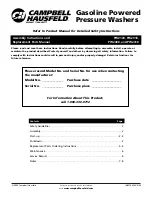
308–529
18
PUMP SERVICE
WARNING
To reduce the risk of serious bodily injury
,
including fluid injection, splashing in the eyes or
on the skin, or injury from moving parts, always
follow the
Pressure Relief Procedure
Warning
before proceeding.
NOTE:
The following metric wrenches are needed:
M10, M13 and M30. Repair kits are available.
Refer to the individual repair sections and the
pump parts page for more details. For the
best results, use all parts in the kits.
NOTE:
There are two dif ferent tool kits to aid in
servicing the pump. P/N 800–298 is used to
ease installation of packings. P/N 800–271
includes the items in 800–298 and tools to aid
in the removal of packing retainers.
Valves
NOTE:
For a set of six valves, order P/N 801–472.
1. Remove the hex plug from the manifold using an
M30 wrench.
2. Examine the o–ring under the hex plug and replace
it if it is cut or distorted.
3. Remove the valve assembly from the cavity; the
assembly may come apart.
4. Install the new valve. Install the o–ring and hex
plug; torque to 75 ft–lb (103 Nm).
NOTE:
Retorque the plug after 5 hours of operation.
Pumping Section
1. Remove the eight capscrews and lockwashers
from the manifold using an M13 wrench.
2. Carefully separate the manifold from the
crankcase.
NOTE:
It may be necessary to tap the manifold lightly
with a soft mallet to loosen.
CAUTION
Keep the manifold properly aligned with the
ceramic plungers when removing to avoid
damage to the plunger or seals.
3. Carefully examine each plunger for any scoring or
cracking and replace as necessary.
Servicing the Plungers
NOTE:
Plunger repair kit, P/N 801–474 is available to
replace retainers, o–rings, washers and
backup rings for three cylinders.
1. Loosen the plunger retaining screw five to six turns,
using an M10 wrench. Push the plunger towards
the crankcase to separate the plunger and
retaining screw.
2. Remove the screw from the plunger and examine
the o–ring, backup ring and copper bearing/gasket
washer. Replace these parts, if necessary, using kit
801–474.
3. Remove the plunger and flinger from the plunger
shaft. Clean, examine and replace parts as
necessary.
4. Inspect the plunger shaft for oil leakage from the
crankcase. If leaking is obvious, replace the oil
seals. Otherwise, DO NOT remove these seals as
they cannot be reused. An oil seal kit is available to
replace the seals.
5. Lightly grease the flinger and oil seal, if it is being
replaced and replace them on the plunger shaft.
Then install the plunger.
6. Lightly grease the retaining screw and the outer
end of the plunger. Place the washer, o–ring and
backup ring around the screw and install the screw
through the plunger. Torque to 14.4 ft–lb (19.5 Nm).
NOTE:
If you plan to replace the packings, refer to
Servicing the V–Packings.
7. Lubricate the outside of each plunger . Slide the
manifold onto the crankcase, being careful not to
damage the seals.
8. Install the capscrews and washers finger–tight.
Torque the screws to 21.7 ft–lb (29 Nm) following
the tightening pattern (Figure 4). Uneven tightening
may cause the manifold to bind or jam.
Figure 4
1
4
2
3
5
8
7
6



































